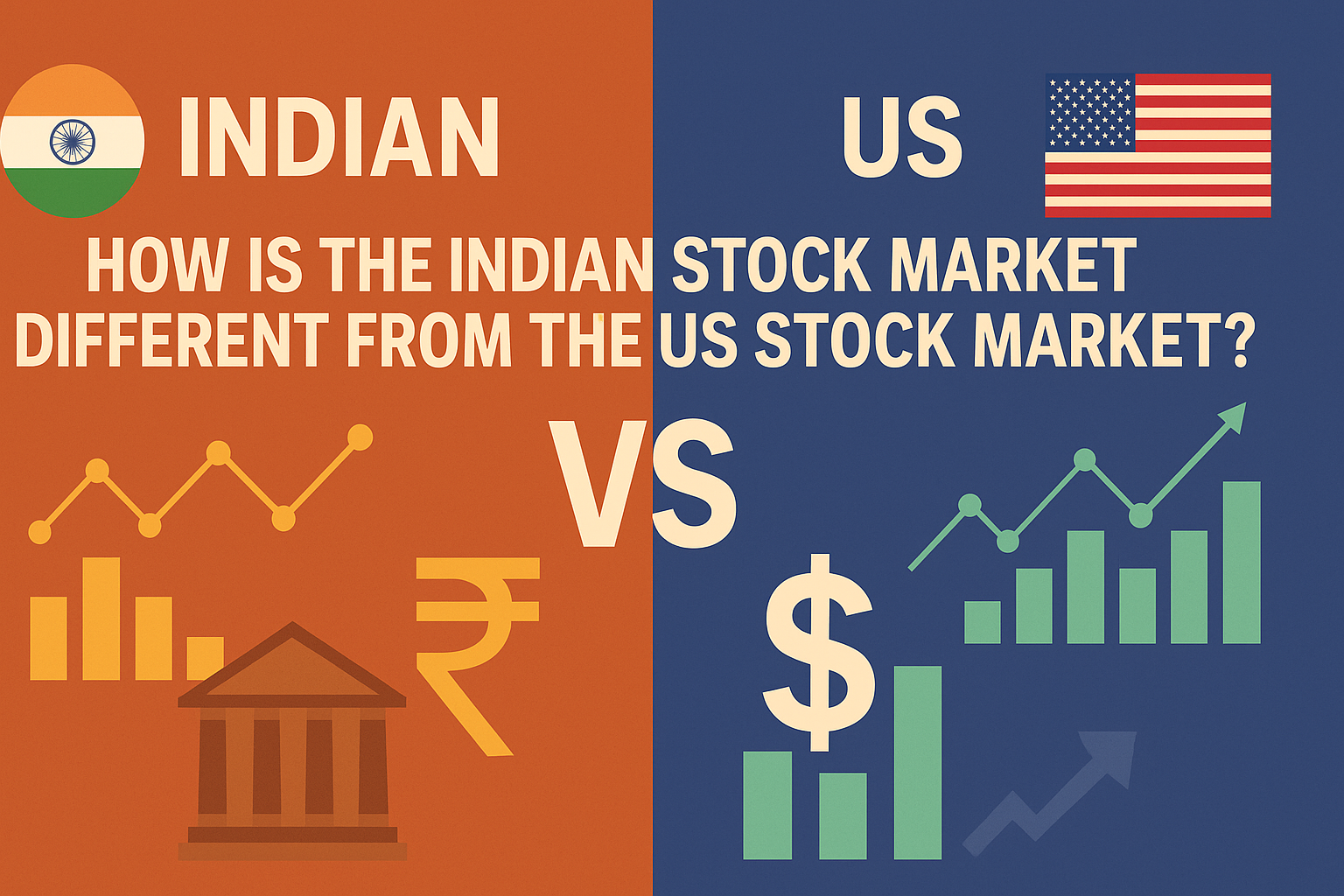How is the Indian Stock Market Different from the US Stock Market?

How Is The Indian Stock Market Different From The US Stock Market?
Stock markets offer a platform for selling and buying of a company’s stock shares. Both India and the United States have significant stock markets, but they operate in different ways. Let’s explore the differences between the Indian stock market and the US stock market in simple words.
1.Size of the Market
In terms of size, the US Stock Market surpasses Indian stock markets significantly. There are more listed companies and a larger total market capitalization.
The Indian stock market is smaller but growing rapidly.
2.Key Stock Exchanges
In India:
- BSE (Bombay Stock Exchange)
- NSE (National Stock Exchange)
In the US:
- NYSE (New York Stock Exchange)
- NASDAQ
Market Timings
- India: the stock market opens from 9:15 am to 3:30 pm IST, Monday to Friday.
- US: the stock market opens from 9:30 am to 4:00 pm EST, Monday to Friday.
Currency Used
The Indian stock market uses the Indian Rupee (currency code: INR). The US stock market operates in US Dollars (currency code: USD)
Types of Firms
- Apple, Google, and Microsoft, as example, are big global tech companies listed in the US.
- Companies in the sectors of banking, energy, IT, and FMCG are more common in India.
Laws and Policies
- Control of the Indian stock market is in the hands of SEBI (Securities and Exchange Board of India).
- SEC (Securities and Exchange Commission) controls the stock market in the US.
Public Participation
- The US market has more retail and institutional investors.
- In India, there has been an increase in retail investors, particularly in the wake of the COVID-19 pandemic.
Taxation of Income
- In India, one is liable to pay capital gains tax if one earn from stock exchange.
- In the US too, there is capital gains tax, but the laws and rates concerning the tax are different than those in India.
Trading Services
- Zerodha, Groww, and Upstox are a few of the most popular in India.
- In the United States, these services are known as Robinhood, E*TRADE, and TD Ameritrade.
Conclusion
The stock markets of India and the US each have areas of strength. The US market is more developed, and larger in proportion to the Indian market, which is growing quickly. As with any other market, potential investors need to understand how the market works as well as the risks involved.
FAQs
- What sets the Indian stock market apart from the US?
Size and development level set the two apart. The US stock market is more developed in terms of size, while the Indian markey is smaller, but expanding rapidly.
- Is it possible for Indians to invest in the US stock market?
Yes. Indians can buy US shares through foreign brokerage firms or apps that allow international investing. However, there are rules set by the RBI and limits under their LRS (Liberalized Remittance Scheme) program.
- Which stock exchange is the oldest in India and the US?
In India, the oldest is the Bombay Stock Exchange (BSE), established in 1875. In the US, the oldest is the New York Stock Exchange (NYSE), started in 1792.
- Do both Markets share the same trading hours?
Indian stock markets open from 9:15 AM to 3:30 PM IST, whereas US stock markets function from 9:30 AM to 4 PM EST, operating during different hours.
5.What is easier for newbies – US or Indian market?
For the residents of India, the Indian stock market is easiler to navigate because of the currency, access, and lower costs involved. The US market might also be good, but it requires more research into foreign exchange and tax options


One thought on “How is the Indian Stock Market Different from the US Stock Market?”